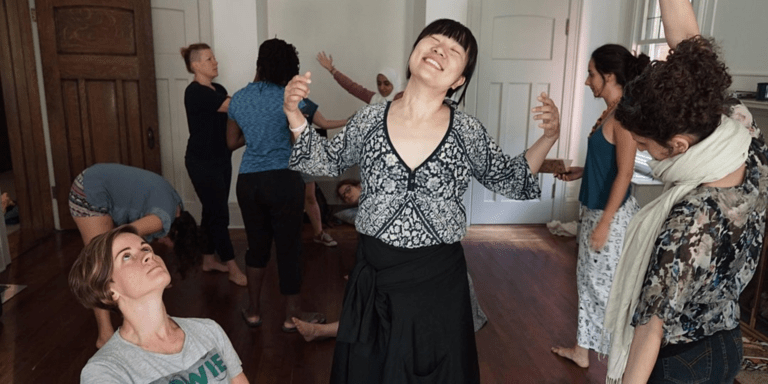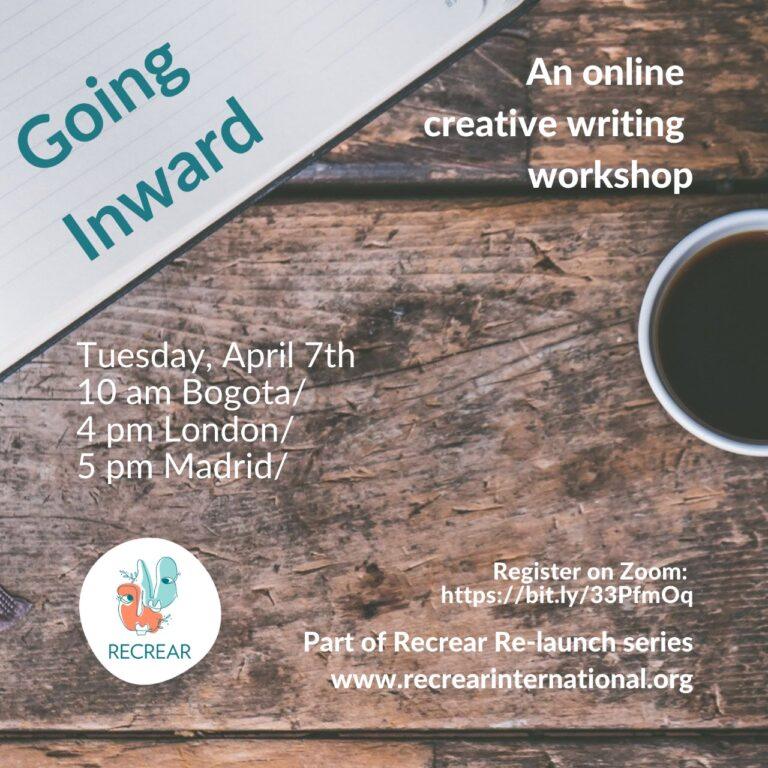Here is how we organised a year-long participatory research to reinvent ourselves
Staying home to limit the spread of COVID-19 is inviting us to face ourselves: our internal dialogue, our habits, our resilience, our fears. The quarantine has happened to overlap with the re-launch of Recrear, scheduled on April 6th, 2020. Over the last 12 months Recrear has been carrying out what traditionally would be referred to as a ‘’strategic review”. To us, it has represented the possibility to hold a reflective space with our community and ask ourselves who we are becoming, and how we want to show up in the world.
I am sure that many of you, as individuals and as part of institutions, are understanding the COVID-19 crisis as a moment of destruction and rebirth. For this reason, in this blog entry I’d like to share the year-long participatory research that Recrear undertook to re-think itself. It has been carried out remotely, and I hope you will find it inspiring and useful in this time where many of us are in quarantine.
Why did we embark on research to reinvent ourselves?
At the end of 2018 we realised that Recrear was growing and changing, but we were not owning our growth in the way we spoke of ourselves. Like an adolescent not fully coming to terms with puberty, we needed a process to accept our maturity and ask: Who are we becoming?
We struggled to step into this renewal, in part because of a weak governance system. In fact, while composed of some exceptional individuals, our board of directors was not working well as a governance body. After investing much energy forming the team over the years, at some point, we simply accepted that there was something about having an external board of directors that made it hard for board members to feel the heartbeat of the organisation. I know many grassroots organisations, as they grow up and form boards, struggle with a feeling of ‘babysitting’ the board. For us, it felt like we had invested energy in managing the board, without much return. We identified that our board wasn’t helpful because we would go to them for input or advice, but we were unable to meaningfully invite them into the thought process behind our reflections. At this time one of the main prompts behind our desire for renewal was experimenting with a new governance model.
Once we started looking into governance we realised that the desire to renew was present in many other aspects of our organisation, so we broadened the scope of our review. We established a team of 3 people, myself, Fiammetta and Khuyen, to design a system for organisational renewal.
In one of our meetings, we reached the conclusion that we had to start with what we love: action research.
Let’s see how research can accompany this renewal…
Here is what we did:
We set up a research team: We invited our community to join what we called a ‘Visioning team’. The 7 people that expressed interest included a mix of past program participants, informal advisors and team members.
We explained we would carry out collective research to inquire into and redefine Recrear’s direction. The intention was to expand our imagination collectively, create new ways to think about collaboration, organising, power, creation and discern our purpose.
We consolidated the team and collectively structured the research: Fia, Khuyen and I hosted the first two meetings and brought together the group of 10 over Zoom. Our intention was to consolidate the team and model a culture of experimentation and openness. We started each meeting with a grounding activity (such as a meditative practice, for example), integrated participatory activities such as writing and movement, made use of break out groups and experimented with tools such as Nearpod to collaborate.
Our first step was to identify together a range of questions we had about Recrear’s future. We asked everyone to share their questions and clustered those into four research areas:
1. Governance, leadership & decision-making
2. Communicating our work
3. Culture, processes & learning
4. Sustainability & money
We got organised in a buddy system: Each participant in the visioning team became a co-researcher. They signed up to go deeper into one of the four areas which interested them the most. Each person worked with a ‘buddy’ to look into the area they selected. Together they carried out research through interviews, discussions, and desk research. Eventually, their task was to engage the rest of the group in a debate on their topic area.
Working in pairs was important in this phase to make the process more agile: it was easier for the two buddies to find a convenient time to meet and to bounce ideas.
We hosted online workshops: Eventually, each pair hosted a webinar and invited the rest of the group to dive into their research area. The webinars included visualisation activities, guided dialogues, and brainstorm sessions. Most interestingly, they always linked the individual to the collective.
To spark our imagination, we looked into multiple forms of organising, borrowed from feminist theory and progressive organisations. At the same time, we wanted to ground this exploration into our personal and collective realities.
We realised that, if as individuals we are going to be making decisions for Recrear, we must take our individual inclinations, feelings, and opinions seriously. For example, during the workshop on our financial model, we did not only inquire into how organisations manage resources but also invited a reflection on how, in our personal lives, we relate to money.
We consolidated the pieces together: Participation has its limits. I have learned it is healthier to fully own such limits, instead of over glorifying it. In this process, all co-researchers were volunteers other than Fia, Khuyen and I, who had a small contract to facilitate the research. For this reason, the three of us took leadership in consolidating all the material together.
We went back and forth with each small team to polish the input that emerged in each workshop and eventually harmonised all content to fit into our new strategy. This document was then reviewed by all the members through comments on a shared google doc.
In addition, the three of us carried out activities such as creating a SWOT analysis, holding interviews with key board and team members, and carrying out desk research. Most importantly, we engaged in ongoing in-depth conversations.
We evaluated: We wrapped up with a final online workshop to evaluate the process. Here we learned participants valued most the opportunity to gain knowledge and expertise around specific organisational areas.
We are now looking to replicate this model and adapt it to support other organisations to rethink themselves and their programs. Plus, we hope this model can address our need to have a board that is thinking and learning together on an ongoing basis. We will test using this model to innovate the concept of governance in small organisations by giving it a participatory research swing.
On a personal note, I have found that this inquiry around organisational renewal has been accompanied by a lot of healing. It was important to have a group of people holding space for my own introspection. I have realised how intimately bound personal and organisational lives can be. I have accepted, held, and forgiven myself for showing up as a whole human within Recrear, and therefore bringing with me all my weaknesses.
Ultimately, I have realised this is how I want to show up in my work. Authentic, as a work in progress, as a constant discovery.
If you are interested in learning more about this process or experiment with it, please do get in touch.
It is our hope that in this time of going inward we can find the courage and lose our inhibition so as to create bolder organisations, that allow us to show up in our work as whole humans.
#strategic review #organisation #strategy #renewal #governance #board of director


